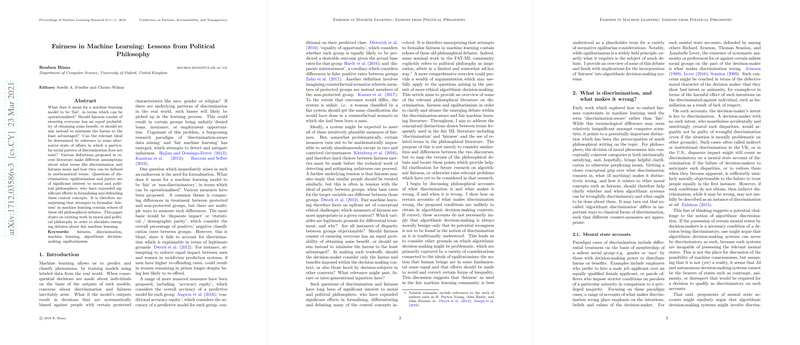An Analysis of Fairness in Machine Learning from a Political Philosophy Perspective
The paper "Fairness in Machine Learning: Lessons from Political Philosophy" by Reuben Binns, published in the Proceedings of the Conference on Fairness, Accountability, and Transparency, explores the complex interplay between algorithmic fairness and philosophical theories of justice and discrimination. The work explores how notions from political philosophy can inform the burgeoning field of fair ML, examining various fairness metrics and their philosophical underpinnings.
Overview of Fairness in Machine Learning
The paper begins by addressing the operationalization of fairness in ML models, highlighting that contemporary approaches often involve measuring the differences in model outputs between protected and non-protected groups. Well-known metrics such as disparate impact, accuracy equity, and equality of opportunity serve as quantitative measures to gauge fairness. However, the paper highlights the inherent impossibility of simultaneously satisfying all fairness criteria due to mathematical constraints. The discussions, therefore, pivot towards making ethical trade-offs between competing fairness objectives.
Philosophical Foundations
Binns draws attention to the deep-rooted debates in political philosophy, focusing on discrimination, egalitarianism, and justice, to better articulate the goals of fair ML. By juxtaposing philosophical theories with ML fairness measures, the work probes critical questions such as the legitimacy of imposing fairness constraints and the contexts in which certain definitions of fairness are more applicable than others.
Discrimination and Its Ethical Dimensions
The analysis of discrimination within this work is multifaceted. It assesses mental state accounts, which attribute discriminatory practices to the intent and beliefs of decision-makers, and considers the implications for algorithmic systems devoid of human-like intent. The paper identifies statistical generalization as a core issue in algorithmic discrimination, challenging the supposed objectivity of ML models.
Egalitarian Norms and Their Implications
Egalitarianism is explored as a central theme, where Binns navigates its relevance through various lenses, such as resource distribution, welfare, and capabilities. The fairness of ML systems is appraised in light of luck egalitarianism—where the delineation between chosen and unchosen inequalities informs the design of algorithms. This involves questioning the inclusion of certain predictive variables and the moral basis for compensatory action.
Practical and Theoretical Implications
The paper's contributions to both the theoretical understanding and practical application of fairness in ML are significant. It advises caution in applying fairness metrics universally, given the context-dependent nature of justice. Moreover, it introduces the concept of spheres of justice to address how disparate contexts—such as economic, social, and cultural domains—should dictate different fairness objectives.
Crucially, the paper argues for a richer integration of contextual information when deploying ML models in practice. The complexity inherent in human life and societal structures necessitates a nuanced approach that extends beyond conventional datasets and simplistic feature vectors. This could involve incorporating broader socio-economic and historical contexts into model training and evaluation.
Speculations for Future Developments
The work implies that future research in AI and ML should remain sensitive to its philosophical roots while exploring technological advancements. The paper encourages ongoing dialogue between technologists and philosophers to refine our understanding of algorithmic fairness. Future developments might include advanced methodologies to better capture and address societal inequalities in ML systems, informed by robust ethical frameworks.
In summary, Reuben Binns' paper offers a comprehensive exploration of fairness in machine learning through an interdisciplinary lens, situated at the intersection of technological innovation and moral philosophy. By bringing insights from political philosophy to bear on modern ML challenges, the paper provides a critical platform for discerning the ethical dimensions of algorithmic decision-making and charts a path toward more socially-attuned AI systems.
